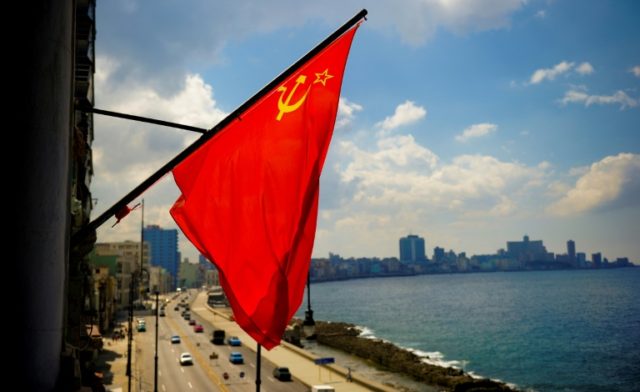Havana (AFP) – Russia is stirring the ghosts of Cuba’s Cold War past as it looks to re-establish its influence in the Communist-run island nation, although this time analysts say Moscow has no intention of bankrolling Havana.
Whereas once the Soviet Union and Cuba were linked by an ideological bond, now pragmatism and a shared rejection of US foreign policy is drawing them together again.
At Havana’s colorful May Day parade Wednesday, Raul Castro, the first secretary of Cuba’s Communist Party, received the highest distinction from the Communist Party of the Russian Federation: the Order of Lenin.
The former Cuba president said the prize — first presented in 1930 by the Soviet Union — pointed to the “historic relations” between the two countries that “have endured different scenarios and today are being reinforced and renewed.”
This rapprochement is not new but has been consolidated by shared opposition to sanctions imposed on Cuba by Washington, which accuses the Caribbean nation of providing military support to Venezuela President Nicolas Maduro, another Moscow ally.
“The effect of this policy is that it isolates the United States on Cuba and we’re opening the door for greater Chinese and Russian presence on the island,” said Ric Herrero, executive director of the Cuba Study Group, which connects Cuban-Americans advocating economic and political freedom on the island.
Relations between Havana and Washington had thawed under former president Barack Obama, but have chilled considerably since Donald Trump’s administration took over.
– ‘Lovers triangle’ –
The Soviet era may have been confined to history, but it hasn’t been forgotten.
“In Cuba, we’ve always had fond memories of Russia,” said 82-year-old Luis Corredera Rodriguez as he played dominos with friends on a Havana sidewalk. “They supported us in everything.”
“They’re friends for life,” added Julio Garcia, 59, although he noted that “the Russians have changed.” In effect, he said, the Cubans have become more Russian than the Russians themselves.
“They’re no longer Soviet, they’re capitalist like everyone.”
Behind the dominos table — Cuba’s national pastime — a parked Russian Lada is passed by a revving classic 1950s American car.
“It’s almost like a lovers triangle between the US, Cuba and Russia: it’s an old relationship, there’s a lot of emotion here,” said Scott B. MacDonald, senior associate of the Americas program at the Center for Strategic and International Studies.
He said the last two years have seen Cuba slide into “a new Cold War,” although with a different dynamic this time.
“At the end of the Soviet Union, it was about $4 billion a year that went to prop up the Cuban economy.”
That came to an end when the Soviet Union dissolved in 1990.
Now, Russia is only Cuba’s third largest commercial partner, after the European Union and China.
“Russia likes the idea of warming up this relationship, but does Russia want to spend $4 billion a year to keep Cuba alive economically?” asked MacDonald.
The US may be wary of Russia sidling up to Cuba but the EU seems to have no issue with it.
The EU ambassadors in Cuba invited their Russian counterpart to their monthly meeting, where Andrei Guskov talked about the collaboration between Moscow and Havana and his desire to increase it, several participants said.
After agreeing to business deals worth $350 million in 2018, Russian investments will allow Cuba to increase its energy production by 20 percent and renew the 14-strong fleet of the national airline, Guskov said.
– ‘No ideological dimension’ –
On top of that, Russia has agreed a 38 million euro ($42 million) loan to modernize Cuba’s military, $1 billion to refurbish its railway lines and agreements in civilian nuclear power and cybersecurity.
This “is part of a larger effort by Russia to destabilize the United States, rather than” a bid “to form a Soviet satellite 90 miles off the (US) shores like during the Cold War,” said Herrero.
However, the friendship between the two countries today is “built on a pragmatic base, without the ideological dimension there was during the Soviet era,” said Nikolai Kalashnikov, deputy director of the Institute of Latin American Studies at the Russian Academy of Sciences.
While Russia is no longer communist, socialist Cuba is driven in part by the threat it will lose its oil aid from crisis-wracked Venezuela — itself creaking under the strain of US sanctions — and its need for cash.
“Cuba needs to export and Russia is a market of 143 million” people, said Santiago Perez, deputy director of the Cuban Research Center for International Policy.
There may no longer be a common ideology, but there are “mutual interests.”
“The relationship with Russia is crucial for us right now, and I think it’s the same for them too.”

COMMENTS
Please let us know if you're having issues with commenting.